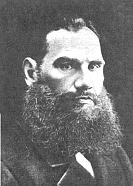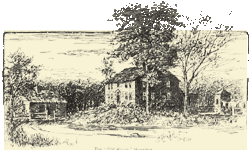"... one would have thought Ballou's work
would have been well known ..."
Leo Tolstoy on Adin Ballou

from The Kingdom of God Is Within You
For fifty years Ballou wrote and published books dealing principally with the question of non-resistance
to evil by force. In these works, which are distinguished by the clearness of their thought and eloquence of
exposition, the question is looked at from every possible side, and the binding nature of this command on every
Christian who acknowledges the Bible as the revelation of God is firmly established. All the ordinary objections
to the doctrine of non-resistance from the Old and New Testaments are brought forward, such as the expulsion of
the money-changers from the Temple, and so on, and arguments follow in disproof of them all. The practical
reasonableness of this rule of conduct is shown independently of Scripture, and all the objections ordinarily
made against its practicability are stated and refuted. Thus one chapter in a book of his treats of non-resistance
in exceptional cases, and he owns in this connection that if there were cases in which the rule of non-resistance
were impossible of application, it would prove that the law was not universally authoritative. Quoting these
cases, he shows that it is precisely in them that the application of the rule is both necessary and reasonable.
There is no aspect of the question, either on his side on his opponents', which he has not followed up in his
writings. I mention all this to show the unmistakeable interest which such works ought to have for men who make
a profession of Christianity, and because one would have thought Ballou's work would have been well known, and
the ideas expressed by him would have been either accepted or refuted; but such has not been the case.
|
"... a 'continuous performance' of vast entertainment ..."
The Hopedale Community

from the reminiscences of Sarah E. Bradbury
The members were men and women drawn together by a common interest in the great principles of liberal and
practical Christianity at a time when church doctrines were narrow.
In addition to the vital principles of ultimate salvation for all, temperance, non-resistance, etc. each one brought some fad of his own —
a belief in Spiritualism, or the vegetable diet. Some were non-shavers, and all, I think, were non-smokers.
The fads, which were almost as dear to the hearts of their owners as the principles, were often discussed in public,
and the free play of the various natures, grave and gay, matter of fact and mischievously humorous,
made these meetings a "continuous performance" of vast entertainment.
The argument was earnest on either side, and usually closed by each with the same emphatic utterance, "So it seems to me and I cannot see it otherwise!"
Neither party convinced the other, but the war of words afforded a certain relief to strenuous natures who, as good non-resistants could indulge in no other form of warfare.
The small band of vegetarians were firm in the faith and provided much amusement for those who had no scruples
against a meat diet. A wag among the latter having discovered that Mr. Asaph Spaulding, one of the most voluble defenders
of vegetarianism had fallen from grace by partaking of codfish charged him with it in open meeting. Mr. Spaulding being
for once at a loss for words his wife came to the rescue, exclaiming, "Asaph wanted a codfish and I got him one."
To shave or not to shave was a burning question. I remember a non-shaver who, having worked his fiery way to the climax exclaimed,
"I have not shaved for five years, and I will never shave again!" Instantly the quiet voice of Mr. Swasey answered, "You may get shaved though."
|

